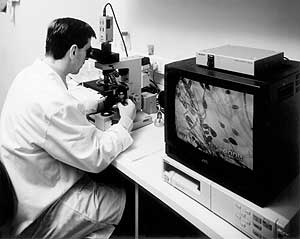
Edition 10 - December, 2001
 Edition 10 - December, 2001 |
Coping with the World’s Biodiversity Data: the Global Biodiversity Information Facility |
Several recent developments have affected both the supply and the demand for information on biodiversity: the growing need for information on biodiversity prompted by the increasing awareness of the importance and complexity of the links between human activities and the natural world; the rapid expansion in the size and sophistication of electronic biological databases due to strong support for basic and applied research in fields such as genetics, molecular biology and ecology; the dramatic increase in the number of inexpensive, powerful computers, combined with the explosive growth of the Internet and advances in software developments for compiling, accessing and exchanging electronic data.
In 1996, the Organisation for Economic Co-operation and Development (OECD) decided to examine support for Biological Informatics and so established a Working Group on Biological Informatics in the framework of the OECD Megascience Forum. This Working Group's Biodiversity Informatics Subgroup concluded that the biodiversity information domain is vast and complex and critically important to society, that the present biodiversity and ecosystem information is neither readily accessible nor fully useful, and that recent technological and political developments present leadership opportunities for OECD countries.

|
The Working Group’s major recommendation was that an international mechanism be formed to make biodiversity data and information accessible worldwide. Hence, it proposed the formation of the Global Biodiversity Information Facility (GBIF).
The Working Group’s report was endorsed at the Meeting of the OECD Committee for Scientific and Technological Policy at Ministerial Level in June 1999. The ministers welcomed the efforts of several countries to undertake the preparatory work necessary for the establishment of GBIF, and a GBIF Interim Steering Committee was created. It completed its work in December 2000, and GBIF came into being on 1 March 2001.
Then GBIF Governing Board was formed, and Dr Christoph L. Häuser (Staatliches Museum für Naturkunde, Stuttgart, Germany) was elected its chairman. In June 2001, the Governing Board chose the Zoological Museum of Copenhagen, Denmark, as the host of the GBIF Secretariat and, in September 2001, elected Dr James L. Edwards (National Science Foundation, USA) as the Executive Secretary of the GBIF Secretariat.
By the end of October 2001 GBIF had 21 voting participants (including Belgium) and 19 associate participants. The voting participants are those that make a financial contribution to the GBIF Secretariat and its core programme of activities.
GBIF will be an interoperable network of biodiversity databases and information technology tools that will enable users to navigate and make use of the world’s vast quantities of biodiversity information in order to generate national economic, environmental and social benefits.
The purpose of GBIF is to make the world’s biodiversity data freely available to all. GBIF will, for the first time, enable one to access and analyse electronically the vast amount of biodiversity data held around the world in Biological Resources Centres, natural history museum collections, libraries, and databanks in order to generate ecosystem information at a global level. GBIF will help design, implement, co-ordinate, and promote the compilation, linking, standardisation, digitisation, and global dissemination of the world’s biodiversity data within an appropriate framework for property rights and due attribution. This will initially be at the species and specimen levels, but ultimately links will be created to data at the molecular, genetic, and ecosystem levels.
GBIF will work in close co-operation with established programmes and organisations that compile, maintain, and use biological information resources. It will have the characteristics of a large, distributed public domain database with a number of interlinked and interoperable modules (databases, software and networking tools, search engines, analytical algorithms, etc.). The participants, working through GBIF, will establish and support a distributed information system that will enable users to access and use vast quantities of new and existing biodiversity information to generate knowledge, wealth, and ecological sustainability.
A major goal of GBIF is to provide inter-operability among species/specimen-level databases and other kinds of biodiversity data, ranging from sequence information to ecosystems data. To facilitate such inter-operability, it is essential to complete the Catalogue of Names of Known Organisms, which can then act as an authority file for cross-database queries.
GBIF will be a distributed facility that encourages co-operation and coherence. It will be global in scale but will be implemented nationally and regionally. It will be open to participation by individuals from every country and offer potential benefits to every country. It will be funded primarily by those countries that have the greatest financial capabilities to do so.
 |
GBIF will help bridge human language barriers by promoting standards and software tools designed to facilitate their adaptation into multiple languages, character sets, and computer encodings. It will disseminate technological capacity by drawing on, and making widely available, scientific and technical information. The objective is to make biodiversity information universally available and to facilitate respect for the contribution made by those who compile and furnish this information.
The purpose behind GBIF is to add value to existing biodiversity informatics activities, remove the potential for duplication, and provide the basis for capacity building that would allow participating countries to position themselves to take advantage of the biological information revolution. The primary focus of GBIF is not to augment or expand directly the current stock of biodiversity knowledge, although this may occur indirectly as GBIF encourages participating countries to increase their taxonomic and research efforts. GBIF will provide a significant opportunity to create new synergies between similar organisations as well as new opportunities to use the existing information base more effectively.
At the strategic level, GBIF would facilitate achieving both biodiversity science outcomes, and it will also make an indirect contribution that will assist the resolution of broader policy issues. GBIF is part of a broader biodiversity framework that is made up of at least four distinct components: natural resource management at the national level, biodiversity knowledge management at the global level, biological research support at the national level, and biodiversity policy environment at the global level.
In order to enhance the contribution of the national nodes and others to GBIF, the European Commission issued a joint call in June 2001 for proposals for RTD actions on the establishment of the European Network of Biodiversity Information (ENBI) under the specific programmes for research, technological development, and demonstration on Quality of life and management of living resources™ and Energy, environment and sustainable development™. The deadline for submitting proposals was 28 September 2001, so the ENBI thematic network should commence its activities in the coming months.
ENBI will offer European researchers and other end-users access to a Europe-wide pool of information and expertise particularly in taxonomic biodiversity. The network will provide a forum for GBIF-related discussions and decision-making on scientific issues that are better handled European-wide than nationally. ENBI will provide views of biodiversity and access to biodiversity data and information at the European bio-geographical level, including the marine environment, with approaches consistent with the nature of the information. It will facilitate and promote the repatriation of biodiversity data, particularly when those data originate from developing countries. It will not create new data but will depend on information provided by national nodes and other relevant European data sources.
Contact
François Guissart
Tel.: +32 (0)2 238 36 41
Fax: +32 (0)2 230 59 12
E-mail: guis@belspo.be
Website: Global Biodiversity Information Facility: www.gbif.org
Home |
Contents Edition 10 -December, 2001 |
Next Article Edition 10 - December, 2001 |